Business
On eve of bankruptcy, U.S. firms shower execs with bonuses

(Reuters) – Nearly a third of more than 40 large companies seeking U.S. bankruptcy protection during the coronavirus pandemic awarded bonuses to executives within a month of filing their cases, according to a Reuters analysis of securities filings and court records.
Under a 2005 bankruptcy law, companies are banned, with few exceptions, from paying executives retention bonuses while in bankruptcy. But the firms seized on a loophole by granting payouts before filing.
Six of the 14 companies that approved bonuses within a month of their filings cited business challenges executives faced during the pandemic in justifying the compensation.
Even more firms paid bonuses in the half-year period before their bankruptcies. Thirty-two of the 45 companies Reuters examined approved or paid bonuses within six months of filing. Nearly half authorised payouts within two months.
Eight companies, including J.C. Penney Co Inc and Hertz Global Holdings Inc, approved bonuses as few as five days before seeking bankruptcy protection. Hi-Crush Inc, a supplier of sand for oil-and-gas fracking, paid executive bonuses two days before its July 12 filing.
J.C. Penney – forced to temporarily close its 846 department stores and furlough about 78,000 of its 85,000 employees as the pandemic spread – approved nearly $10 million in payouts just before its May 15 filing. On Wednesday, the company said it would permanently close 152 stores and lay off 1,000 employees.
The company declined to comment for this story but said in an earlier statement that the bonuses aimed to retain a “talented management team” that had made progress on a turnaround before the pandemic.
The other companies declined to comment or did not respond. In filings, many said economic turmoil had rendered traditional compensation plans obsolete or that executives getting bonuses had forfeited other compensation.
Luxury retailer Neiman Marcus Group in March temporarily closed all of its 67 stores and in April furloughed more than 11,000 employees. The company paid $4 million in bonuses to Chairman and Chief Executive Geoffroy van Raemdonck in February and more than $4 million to other executives in the weeks before its May 7 bankruptcy filing, court records show. Neiman Marcus drew scrutiny this week on a plan it proposed after filing for bankruptcy to pay additional bonuses to executives. The company declined to comment.
Hertz – which recently terminated more than 14,000 workers – paid senior executives bonuses of $1.5 million days before its May 22 bankruptcy, in part to recognise the uncertainty they faced from the pandemic’s impact on travel, the company said in a filing.
Whiting Petroleum Corp bestowed $14.6 million in extra compensation to executives days before its April 1 bankruptcy. Shale pioneer Chesapeake Energy Corp awarded $25 million to executives and lower-level employees in May, about eight weeks before filing bankruptcy. Both cited fallout from the pandemic and a Saudi-Russian oil price war, which they said rendered their incentive plans ineffective.
Reuters reviewed financial disclosures and court records from 45 companies that filed for bankruptcy between March 11, the day the World Health Organization declared COVID-19 a pandemic, and July 15. Using a database provided by BankruptcyData, a division of New Generation Research Inc, Reuters reviewed companies with publicly trade stock or debt and more than $50 million in liabilities.
Such bonuses have long spurred objections that companies are enriching executives while cutting jobs, stiffing creditors and wiping out stock investors. In March, creditors sued former Toys ‘R’ Us executives and directors, accusing them of misdeeds that included paying management bonuses days before its 2017 bankruptcy. The retailer liquidated in 2018, terminating more than 31,000 people.
A lawyer for the executives and directors said the bonuses were justified, given the extra work and stress on management, and that Toys ‘R’ Us had hoped to remain in business after restructuring.
In June, congressional Democrats responded to the pandemic-induced wave of bankruptcies by introducing legislation that would strengthen creditors’ rights to claw back bonuses. The bill – the latest iteration of a proposal that has long failed to gain traction – faces slim prospects in a Republican-controlled Senate, a Democratic aide said.
Firms paying pre-bankruptcy bonuses know they would face scrutiny in court on compensation proposed after their filings, said Clifford J. White III, director of the U.S. Trustee Program, a Justice Department division charged with monitoring bankruptcy proceedings. But the trustees have no power to halt bonuses paid even days before a company’s bankruptcy filing, he said, allowing firms to “escape the transparency and court review.”
Dodging bonus restrictions
The 2005 legislation required executives and other corporate insiders to have a competing job offer in hand before receiving retention bonuses during bankruptcy, among other restrictions. That forced failing firms to devise new ways to pay the bonuses, according to some restructuring experts.
After the 2008 financial crisis, companies often proposed bonuses in bankruptcy court, casting them as incentive plans with goals executives must meet. Judges mostly approved the plans, ruling that the performance benchmarks put the compensation beyond the purview of the restrictions on retention bonuses. The plans, however, sparked objections from Justice Department monitors who called them retention bonuses in disguise, often with easy milestones.
Eventually, companies found they could avoid scrutiny altogether by approving bonuses before bankruptcy filings. Dozens of companies have approved such payouts in the last five years, said Brian Cumberland, an executive compensation expert at consulting firm Alvarez & Marsal who advises companies undergoing financial restructurings.
Companies argue the bonuses are crucial to retaining executives whose departures could torpedo their businesses, ultimately leaving less money for creditors and employees. Now, some companies are bolstering those arguments by contending that their business would not have cratered without the economic turmoil of the pandemic.
The pre-bankruptcy payouts are needed, companies say, because potential stock awards are worthless and it would be impossible for executives to meet business targets that were crafted before the economic crisis. The bonuses ensure stability in leadership that is needed to hold faltering operations together, the firms contend.
Some specialists argue the bonuses are hard to justify for executives who may have few better job options in an economic crisis.
“With double-digit unemployment, it’s a strange time to be paying out retention bonuses,” said Adam Levitin, a professor specializing in bankruptcy at Georgetown University’s law school.
Closed stores, big bonuses
J.C. Penney has not posted an annual profit since 2010 as it has struggled to grapple with the shift to online shopping and competition from discount retailers. The 118-year-old chain, at various points, employed more than 200,000 people and operated 1,600 stores, figures that have since been cut more than half.
On May 10, J.C. Penney’s board approved compensation changes that paid top executives, including CEO Jill Soltau, nearly $10 million. On May 13, Soltau received a $1.7 million long-term incentive payment and a $4.5 million retention bonus, court filings show.
The annual pay of the company’s median employee, a part-time hourly worker, was $11,482 in 2019, a company filing shows.
J.C. Penney filed for bankruptcy two days after paying Soltau’s bonuses. At a hearing the next day, a creditors’ lawyer argued the payouts were designed to thwart court review. The payouts were timed “so that they didn’t have to put it in front of you,” said the lawyer, Kristopher Hansen, addressing U.S. Bankruptcy Judge David Jones.
Jones – who is also overseeing the Whiting Petroleum, Chesapeake Energy and Neiman Marcus cases – told Reuters that such bonuses are “always a concern” in bankruptcy cases. “That said, the adversarial process demands that parties put the issue before me before I can take action,” he added, emphasising he was speaking of general dynamics applicable to any case. “A comment made in passing by a lawyer is not sufficient.”
In its statement earlier this year, J.C. Penney said the bonuses were among a series of “tough, prudent decisions” taken to safeguard the firm’s future.
Dennis Marten – a shareholder who said he once worked at a J.C. Penney store – disagrees. He has appeared at court hearings pleading for an investigation of the company’s leadership.
“Shame on her for having the gall to get that money,” he said of Soltau.
Reporting and photo: Reuters
Business
Bestbuy Maldives, Atmosphere Core elevate chef training with Michelin-star masterclass
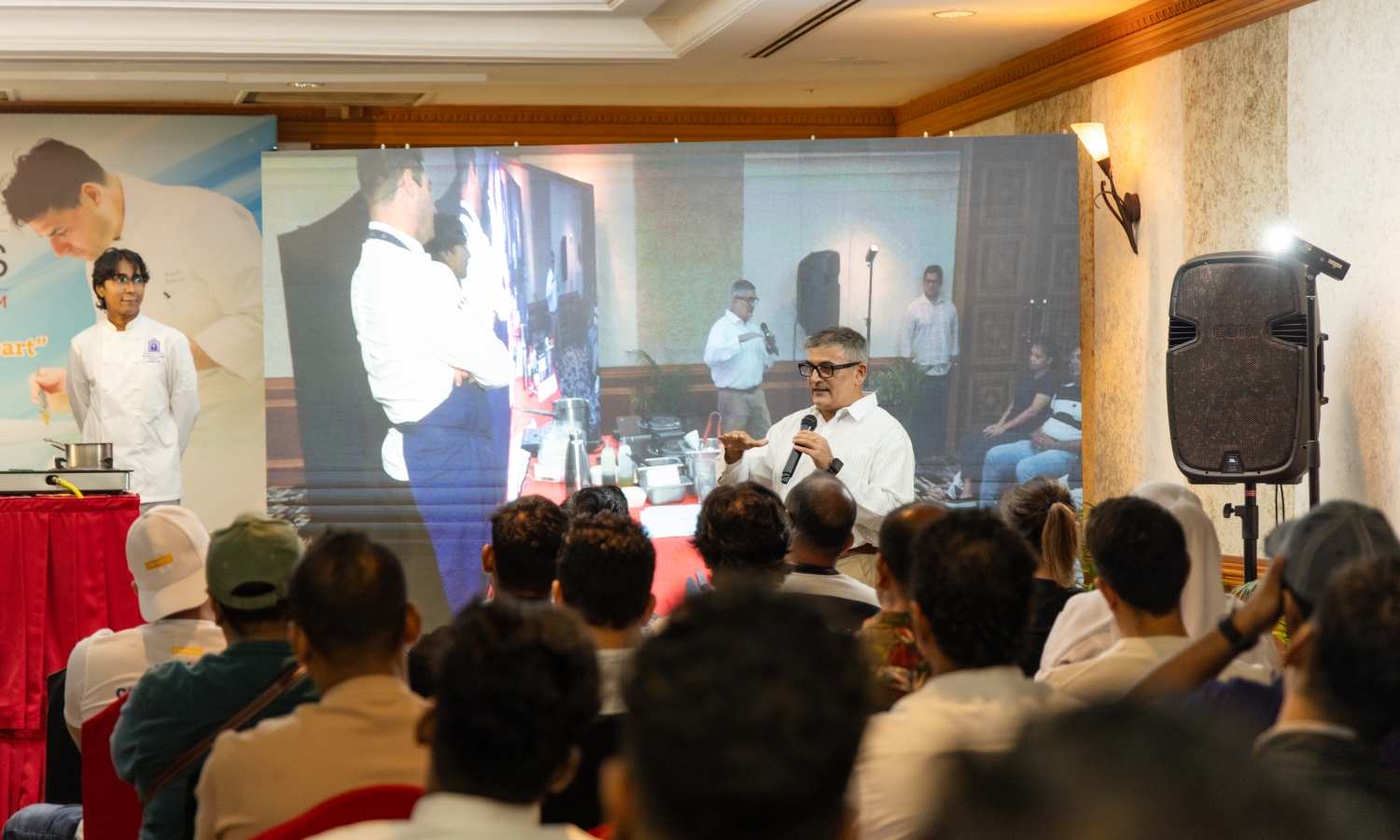
Bestbuy Maldives (BBM) brought together 100 chefs from leading resorts and restaurants across the country on 24 November for an exclusive culinary masterclass led by Italian One-Michelin-Star Chef Pasquale Palamaro. Held at Hulhule Island Hotel (HIH), the full-house session marked a key highlight of the ongoing “Mediterranean Soul, Maldivian Heart” culinary series presented by Atmosphere Hotels & Resorts in collaboration with BBM.
The masterclass formed the Malé City chapter of the broader programme, which features a lineup of events hosted at RAAYA by Atmosphere and VARU by Atmosphere throughout November 2025. The HIH masterclass served as a platform for professional development, skill exchange, and hands-on learning for chefs from some of the Maldives’ most distinguished culinary teams.
Chef Pasquale, celebrated for his work at Indaco Restaurant in Amalfi, guided participating chefs through a series of live demonstrations that reflected his signature philosophy—one that emphasises intuition, simplicity, and a deep respect for natural ingredients.
“Cooking, to me, is a dialogue with nature — an art of transforming simplicity into beauty. Bringing Indaco’s spirit to the Maldives is an opportunity to merge two coasts and two cultures through taste, technique, and emotion,” he shared during the programme.

Participants explored Mediterranean-inspired methods adapted to Maldivian produce, with Chef Pasquale showcasing dishes rooted in coastal heritage and contemporary craftsmanship. The session also encouraged discussion around ingredient integrity, sustainability-led cooking, and the evolving expectations of today’s luxury diners.
The fully subscribed masterclass reaffirmed BBM’s long-running commitment to cultivating professional excellence within the Maldives’ hospitality sector.
As the authorised distributor of globally renowned culinary and F&B brands, BBM has built a reputation for its Masterclass Series, which brings international expertise to local professionals through practical workshops and high-level training. This latest edition added a Michelin-starred perspective to the growing body of knowledge BBM continues to nurture across the industry.
Ali Afrah Hassan, Head – Human Resources, Administration & Corporate Affairs at BBM, highlighted the importance of consistent capacity building in the sector.
“This masterclass reflects our ongoing commitment to strengthening the skills of the Maldivian culinary community. By creating opportunities for chefs to learn directly from international experts, we help broaden professional exposure and support the industry’s growth. BBM will continue to invest in platforms that uplift local talent and contribute to raising the overall standard of hospitality in the Maldives,” he said.
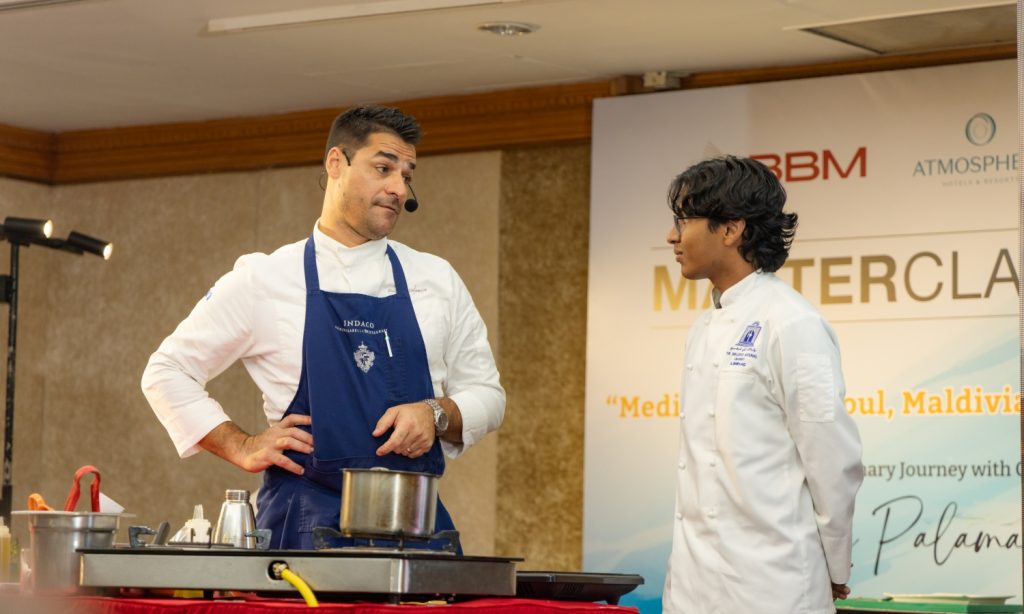
The masterclass follows two immersive days at RAAYA by Atmosphere earlier in the month, where guests joined farm experiences, tasting sessions, and a hands-on workshop before a five-course dinner curated by Chef Pasquale. The series will continue with a 4-Hands Dinner at Kaagé on 27 November and a masterclass with a five-course dinner at NÜ on 28 November at VARU by Atmosphere.
Anupam Banerjee, Vice President, Food & Beverage at Atmosphere Core, emphasised how the collaboration bridges traditions and culinary ideologies.
“All our island resorts have long been recognised for their culinary offerings,” he noted. “Through Chef Pasquale’s artistry and our island-inspired ethos, we are crafting an evocative dialogue between Mediterranean and Maldivian gastronomies that not only captivates the palate but also champions environmental stewardship and celebrates the cultural richness of both regions.”
For attending chefs, the session offered more than demonstrations—it provided the rare opportunity to learn directly from a Michelin-starred figure whose approach blends innovation with a respect for locality. Many participants described the workshop as an opportunity to refine technique, discover new applications for familiar ingredients, and build valuable connections within the professional community.
With strong engagement and enthusiastic feedback from attendees, the masterclass stands as another milestone in BBM’s long-standing role in elevating culinary standards in the Maldives.
Business
2 decades of culinary excellence: BBM’s founding legacy with Hotel Asia continues in 2025

Hotel Asia Exhibition and International Culinary Challenge is referred to be the hospitality industry event in the Maldives. In this year’s Culinary Challenge (19 to 22 October 2025) comprising competitions over 20 categories, most will take place at the Faculty of Hospitality and Tourism Studies, Maldives National University, and some at the Synthetic Track, Hulhumalé.
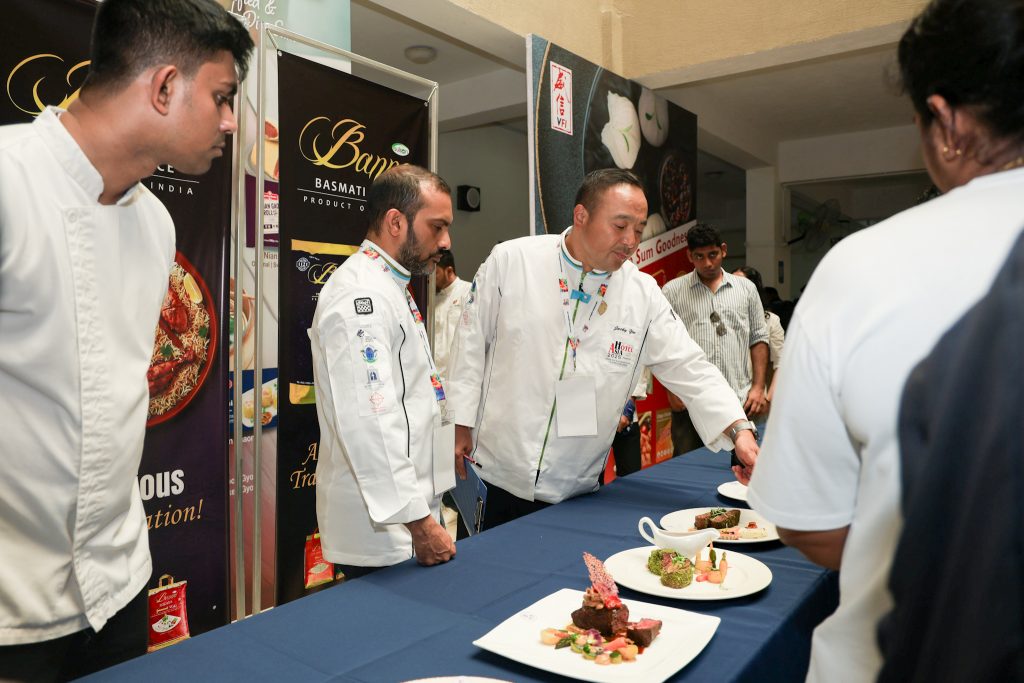
A Founding Partnership that Endures
Since the very first edition in 2001, Bestbuy Maldives (BBM) has played a central role in shaping the International Culinary Challenge into the Maldives’ most prestigious culinary platform. The event has become a cornerstone for professional development, bringing together chefs from across the Maldives to compete, learn, and showcase their craft.

BBM and their associated Principals sponsor an overwhelming majority of categories. “From the beginning, our goal has been to create opportunities for Maldivian chefs to rise to global standards. This partnership has grown with the industry itself,” said A.V.S. Subrahmanyam, Chief Operating Officer of BBM.
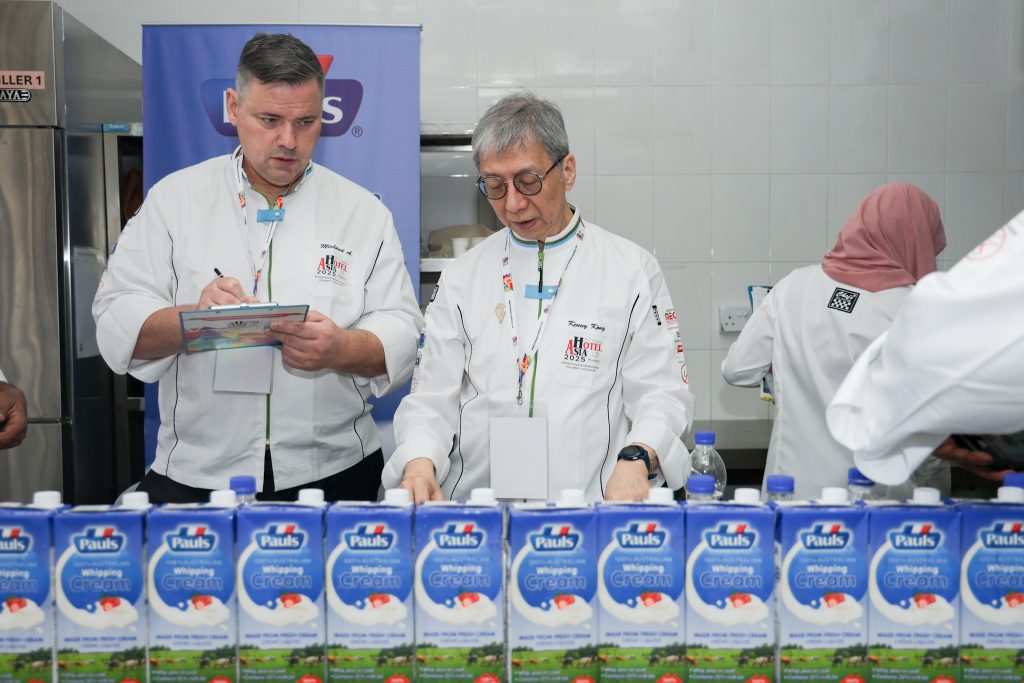
Nurturing Local Talent
BBM’s contribution extends beyond sponsorship. The company has built a long-term system for recognizing and developing local culinary talent.
- BBM Chairman’s Trophy for the Best Maldivian Competitor.
- Most Promising Young Chef Award for emerging talent.
- Global exposure programs for Maldivian chefs through sponsored participation in international events.
- Pro-bono Masterclasses with world-renowned chefs to encourage learning and innovation.
Investing in the Future of Hospitality
Through initiatives such as Building Young Talent, BBM continues to mentor aspiring professionals and support the next generation of chefs. The company also promotes inclusivity by sponsoring opportunities for female and young chefs to gain international exposure.
BBM’s industry partnerships include its role as Title Sponsor of the Hotelier Maldives Awards, celebrating excellence across the Maldivian hospitality sector.
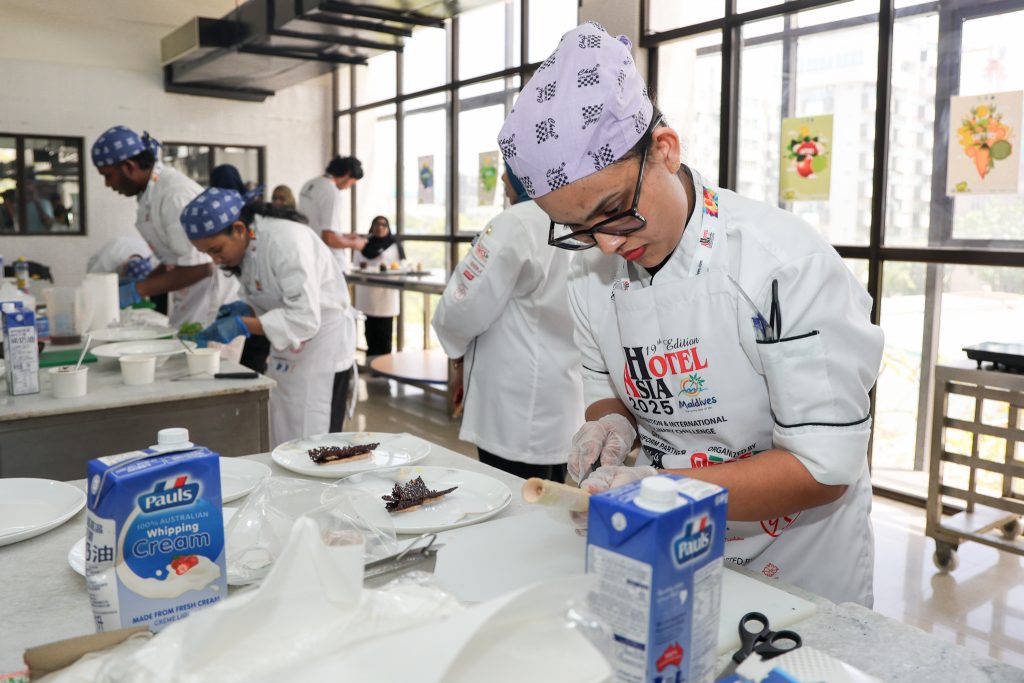
Proud Sponsors of Culinary Excellence
In 2025, BBM and its partner brands proudly sponsor 14 competition categories and 8 Main Awards, further strengthening their role in the development of culinary arts in the Maldives. Categories include Decorated Cake, Artistic Showpiece, Bread and Pastry Display, Three Desserts (Display), Desserts, Rice Dish, Asian Noodles, Team Challenge, Maldivian Dish, Creative Sandwich, Young Chef, Tea Challenge, tapas/finger food, and Iced Mocktail.
Business
Bestbuy Maldives, MNU forge partnership to advance hospitality education

The Maldives National University – Faculty of Hospitality and Tourism Studies (MNU-FHTS) and Bestbuy Maldives (BBM) have officially signed a Memorandum of Understanding (MoU) to strengthen industry-academic collaboration and advance hospitality education in the Maldives.
The MoU was signed by Dr Aishath Shehenaz Adam, Vice Chancellor of MNU, and Ismail Hilmy, Chairman and Managing Director of BBM, during a ceremony attended by the university’s Chancellor Dr Mahmood Shaugee, senior management, and representatives from both organisations.
This partnership marks a significant milestone in developing a state-of-the-art Food and Beverage Practical Demonstration Kitchen at MNU-FHTS. BBM will support the upgrading of the existing Garde Manger kitchen and classrooms, contributing financially and materially to create a modern, industry-standard learning environment for future hospitality professionals.
Beyond infrastructure, the collaboration will extend to academic and training support, research and innovation in culinary arts, community engagement, and professional networking opportunities, ensuring that students gain practical, real-world experience aligned with industry expectations.
Highlighting the broader purpose of this partnership, BBM stated that, “This is a significant step in the direction of BBM’s vision involving hospitality industry outreach in the Maldives — because tomorrows start today. Initially, we will set up a world-class model kitchen that will be suitable for masterclasses and hands-on training for students; and also for product demonstrations, masterclasses, and interaction with groups of customers.”
Speaking at the ceremony, representatives from both institutions emphasised their shared vision to promote excellence in education, innovation, and human capital development in the Maldivian hospitality sector. This partnership underscores BBM’s continued commitment to supporting education and industry growth, and MNU-FHTS’s mission to bridge the gap between academia and industry — nurturing the next generation of hospitality leaders in the Maldives.
-

 Action1 week ago
Action1 week agoNiyama Private Islands enhances surf lifestyle with stylish new surf venue
-

 Featured1 week ago
Featured1 week agoIntimate island experiences shape Valentine’s Day at InterContinental Maldives Maamunagau Resort
-

 News7 days ago
News7 days agoFushifaru Maldives blends cultural experiences with new in-house activities
-

 Featured5 days ago
Featured5 days agoYear of the Horse celebrated with island-inspired festivities at InterContinental Maldives Maamunagau Resort
-

 News6 days ago
News6 days agoMaldives resort holidays included in Golden Globes gift bags
-

 Excursions5 days ago
Excursions5 days agoDiscover Raa Atoll: Ifuru Island Maldives adds new dive packages for 2026
-

 Featured4 days ago
Featured4 days agoSt. Regis Maldives Vommuli Resort sets stage for 2026 with influential Tastemaker residencies
-

 Featured5 days ago
Featured5 days agoNew era in reef conservation: Six Senses Kanuhura launches data-led Coral Census









